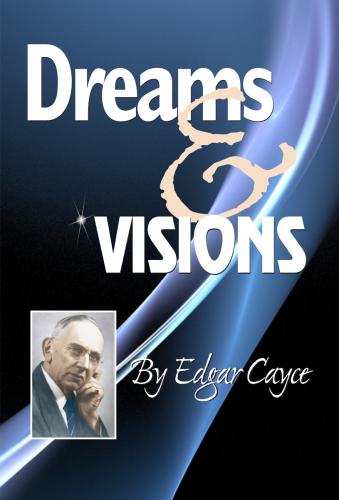Dreams
&
By Edgar Cayce
A.R.E. Press • Virginia Beach • Virginia
Copyright © 2008
by the Edgar Cayce Foundation
1st Printing, March 2009
Printed in the U.S.A.
All rights reserved. No part of this book may be reproduced or transmitted in any form or by any means, electronic or mechanical, including photocopying, recording, or by any information storage and retrieval system, without permission in writing from the publisher.
A.R.E. Press
215 67th Street
Virginia Beach, VA 23451-2061
ISBN-13: 978-0-87604-546-6 (trade pbk.)
Editor's Note
All of Edgar Cayce's discourses are now available on CD-Rom from A.R.E. Press at ARECatalog.com or 800-333-4499.
Edgar Cayce Readings © 1971, 1993-2007
by the Edgar Cayce Foundation.
All rights reserved.
Cover design by Richard Boyle
Contents
Foreword: Who Was Edgar Cayce?
An Explanation of Cayce's Discourses by John Van Auken
An Overview of Edgar Cayce on Dreams and Visions by Kristie E. Knutson
Chapter 1 Cayce on Sleep and Dreams
Chapter 2 Receiving Life Guidance in Dreams
Chapter 4 Dreams, Visions, and Spiritual Growth
Chapter 5 Communication with the Dead in Dreams
Chapter 6 The Dreams of Edgar Cayce
Foreword
Who Was Edgar Cayce?
Edgar Cayce (1877-1945) has been called “the sleeping prophet,” “the father of holistic medicine,” “the miracle man of Virginia Beach,” and “the most documented psychic of all time.” For forty-three years of his adult life, he had the ability to put himself into some kind of self-induced sleep state by lying down on a couch, closing his eyes, and folding his hands over his stomach. This state of relaxation and meditation enabled him to place his mind in contact with all time and space and to respond to any question he was asked. His responses came to be called “readings” and contain insights so valuable that, even to this day, Cayce's work is known throughout the world. Hundreds of books have explored his amazing psychic gift, and the entire range of Cayce material is accessed by tens of thousands of people daily via the Internet.
Although the vast majority of the Cayce material deals with health and every manner of illness, countless topics were explored by Cayce's psychic talent: dreams, philosophy, intuition, business advice, the Bible, education, child rearing, ancient civilizations, personal spirituality, improving human relationships, and much more. In fact, during Cayce's lifetime he discussed an amazing ten thousand different subjects!
The Cayce legacy presents a body of information so valuable that Edgar Cayce himself might have hesitated to predict its impact on contemporary society. Who could have known that eventually, terms such as meditation, auras, spiritual growth, reincarnation, and holism would become household words to millions? Edgar Cayce's A.R.E. (the Association for Research and Enlightenment, Inc.) has grown from its humble beginnings to an association with Edgar Cayce Centers in countries around the world. Today the Cayce organizations consist of hundreds of educational activities and outreach programs, children's camps, a multi-million-dollar publishing company, membership benefits and services, volunteer contacts and programs worldwide, massage and health services, prison and prayer outreach programs, conferences and workshops, and affiliated schools (Atlantic University and the Cayce/Reilly School of Massotherapy).
Edgar Cayce was born and reared on a farm near Hopkinsville, Kentucky. He had a normal childhood in many respects. However, he could see the glowing energy patterns that surround individuals. At a very early age he also told his parents that he could see and talk with his grandfather—who was deceased. Later, he developed the ability to sleep on his schoolbooks and retain a photographic memory of their entire contents.
Eventually, he met and fell in love with Gertrude Evans, who would become his wife. Shortly thereafter, he developed a paralysis of the vocal cords and could scarcely speak above a whisper. Everything was tried, but no physician was able to locate a cause. The laryngitis persisted for months. As a last resort, hypnosis was tried. Cayce put himself to sleep and was asked by a specialist to describe the problem. While asleep, he spoke normally, diagnosing the ailment and prescribing a simple treatment. After the recommendations were followed, Edgar Cayce could speak normally for the first time in almost a year! The date was March 31, 1901—that was the first reading.
When it was discovered what had happened, many others began to want help. It was soon learned that Edgar Cayce could put himself into this unconscious state and give readings for anyone—regardless of where he or she was. If the advice was followed, the individual got well. Newspapers throughout the country carried articles about his work, but it wasn't really until Gertrude was stricken with tuberculosis that the readings were brought home to him. Even with medical treatments, she continued to grow worse and was not expected to live. Finally, the doctors said there was nothing more they could do. A reading was given and recommended osteopathy, inhalants, enemas, dietary changes, and prescription medication. The advice was followed and Gertrude returned to perfectly normal health! For decades, the Cayce readings have stood the test of time, research, and extensive study. Further details of Cayce's life and work are explored in such classic books as There Is a River (1942) by Thomas Sugrue, The Sleeping Prophet (1967) by Jess Stearn, Many Mansions (1950) by Gina Cerminara, and Edgar Cayce: An American Prophet (2000) by Sidney Kirkpatrick.
Throughout his life, Edgar Cayce claimed no special abilities, nor did he ever consider himself to be some kind of twentieth-century prophet. The readings never offered a set of beliefs that had to be embraced but instead focused on the fact that each person should test in his or her own life the principles presented. Though Cayce himself was a Christian and read the Bible from cover to cover for every year of his life, his work was one that stressed the importance of comparative study among belief systems all over the world. The underlying principle of the readings is the oneness of all life, a tolerance for all people,
